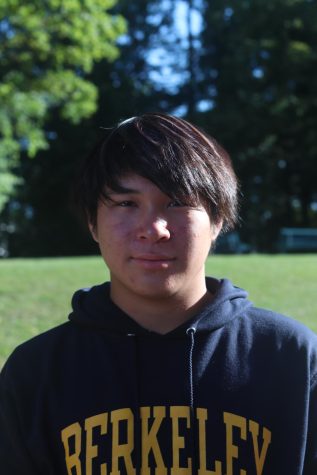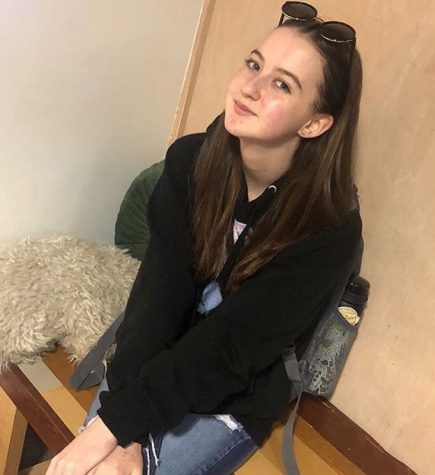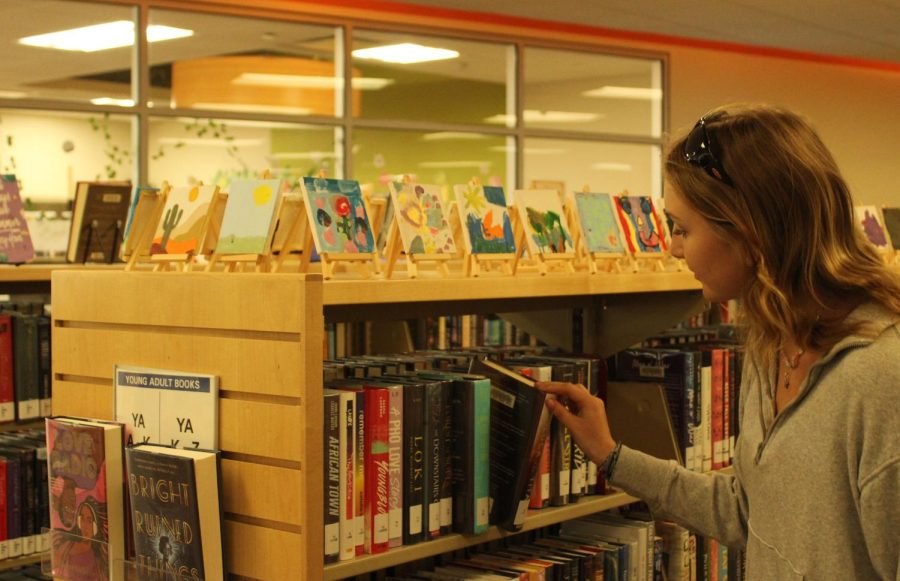Editor’s note: Portrait has elected to withhold the names of the two boys who are the subject of this story. This was done out of respect for their wishes and those of their mother, as well as to prevent ELPL from excluding the two using their full names.
For many ELHS students, the East Lansing Public Library is a safe and quiet place to go after school, either to study or to wait for their parents to pick them up. Some participate in the after school program facilitated by the library, held in the teen room. But for J (10) and T (12), two brothers whose confrontation with the library director caught the attention of Black Lives Matter Lansing and WKAR, MSU’s news-radio station, this sense of safety was broken.
After an exam day on Jan. 11, 2023, the two brothers went to the ELPL as they had done many times before. That day was a half day, so the two needed to wait longer until their mom could pick them up after finishing work in Okemos, around 5 p.m. According to T, the two were working on homework when they were approached by a library staff member.
“When she first walked in, the first thing she said was I need to talk to him,” T said.
The staffer, who the brothers identified as a female, was likely either Kristen Shelley, the library’s director, or the assistant director, according to an email sent by Shelley to staff obtained by Portrait using the Freedom of Information Act. The staffer was talking to J, T’s younger brother. Wondering what was happening, T asked why they needed to talk to his brother.
“I already knew what she was referring to, they had already kicked two people out for that same incident,” T said. “So I just asked her, what do you need to talk to him about? She wouldn’t tell me, so I was like, ‘that’s my little brother, he’s not talking to anybody. Tell me what you want to talk to him about.’”
Then, according to T, the staffer elected to just hand the forms and papers she was holding, including an exclusion letter, to J. The exclusion letter confirmed T’s suspicions: his brother was being accused of being involved in a burning incident back in the fall, with the letter listing the “destruction of property” clause as the reason. But an exclusion letter requires a name to be valid, and the exclusion letter given to J did not include his name. Both brothers were confused by the accusations, and denied them.
“[My older brother] said ‘it was a public library, you can’t kick someone out of a public library unless they’re doing something or if you have video proof of them doing it,” J said.
T also knew the three that were involved in the burning incident in October, as well as that two Black kids were previously excluded, with the third being caucasian– meaning now three Black kids were being excluded, when there should’ve been two maximum. This was not mentioned by library staff until later.
At this point, the library’s director’s email states the brothers refused to have a conversation with staff and “did so with loud offensive language.” While T did utilize profanity in his refusals, he later told an officer that it was because he was upset over the false accusation. They also say the staffer was hostile.
“She was very hostile when she was talking to us, she wasn’t polite,” T said. “She didn’t ask nicely. She was demanding when she came in there.”
The director and assistant director then left. While they were away from the teen room, they called the police, who arrived soon after. T was confident that the police would correct the misidentification and recalls assuring everyone in the room it would be fine.
According to J, there were people in the room who were scared, but along with his brother, he assured them that nothing would happen.
“Why be scared? That was the whole point of [what she was doing]. She wanted us to worry or leave. Like no, we’re going to stay here,” J said. “We knew we were weren’t in the wrong, we knew we didn’t do anything that wasn’t right.”
Slightly before the police arrived, J called his mother, and had her on the phone when the two directors re-entered the room with the police. At this point, Shelley, the director, had spoken with the officers, identified in a FOIA filed by Portrait as Jeremy Hamilton and Dean Kelley, telling them it was a half day of school, that the library had “issues with teens” who stole bikes, burned the wall in the men’s bathroom, used abusive language towards staff, and stolen snacks. She said she had approached the brothers asking them to leave, which she said they refused to do so, with obscene language. The conversation ended with the officers telling her she would have to hand the papers to J in front of them.
After Shelley and Bush had finished trying to hand J the papers again, the police asked to talk to the boys. J, not wanting to speak with them, switched his mother to speaker so she could speak to them instead, in addition to T, who was already speaking with the officers. T noted that J was angry, and told him to calm down and that he didn’t have to talk to anyone. The mother arrived by car soon after.
“[When she arrived, she said] J barely goes to the library,” T recalled. “She was like, ‘I’m not gonna sit here and act like my kids are angels, and they do stupid things, but this is something that I know for sure they didn’t do.’”
Again, the brothers reiterated that since two Black males were already excluded, it did not make sense to exclude another. They also recalled stating multiple times that J rarely went to the library, opting to workout or play basketball at a cousin’s house instead.
“[The officers] were understanding… they understood the situation. He apologized to us, and was like, sorry, you’re right, she doesn’t have any proof… you have the right to be here,” T said.
Following the conversation and the mother’s arrival, Shelley reappeared from the back room with still images of the surveillance footage, which the police had requested. According to J, Hamilton and Kelley nearly immediately concurred that the pictures did not match the boys, and told them so. This is reflected in Kelley’s report narrative, obtained via a FOIA sent by Portrait.
“While both the subjects in the pictures were similar to in height/build [to the accused] and both had short dreads, upon inspection of the facial features in the pictures, to the best of my ability with the quality of the pictures, I did not think that either of the subjects in either one of the pictures was [the accused],” Kelley wrote.
Hamilton concurred, writing that his “more detailed comparison” led him to the conclusion it was not the same person, only noting one similarity between J and the suspects: they were Black males, with dreads.
With officers Hamilton and Kelley in agreement, and the brother’s mother at the library, the staffers, who the brothers and police identified as Bush and Shelley, returned to the teen room to apologize and speak with the mother and brothers. The family was still upset over the situation, noting again that the only similarity, and reason for trying to exclude J, was that he is Black and had dreads.
“They already served two Black men, so therefore you’re going out of your way to try to serve another Black man, to get him out of the library,” J said.
Still, the T doesn’t want to say it was racially motivated. He is upset, however, that he didn’t hear Shelley apologize to any of them, only noting that Bush apologized. This is again confirmed by the narrative of the responding officers, who noted someone with “a blue dress, yellow scarf, and glasses” is the one who apologized, while Shelley walked away. Another thing recalled by the brothers and the officers was Shelley’s comment about her husband.
“Shelley stepped in and said [while we were examining the photos] “I don’t need to share this information but let me just tell you something, my husband is Black.’ She said, ‘I’m trying not to be racist.’”
This upset the brothers.
“She had the nerve to say I have a Black husband, and she got in my face. I’m like, ‘this is what you all do,’ and she was like ‘matter of fact, I have a Black husband,’” J said.
In the end, J felt it was a waste of time. In addition to nothing coming out of the situation, it had made people upset. He still noticed Shelley continuing to doubt that it was truly a case of misidentification, saying that the shoes were also the same, in addition to pulling officer Kelley aside.
“What does that have to do with anything? After that I said, ‘if I have a taser, does that make me a cop?’” J recalled saying. “And I asked the cop that, and he just stood there and smirked and just kinda laughed and said, no that doesn’t.”
The narrative filed by officer Kelley also describes the conversation Shelley had with the officer as she pulled him away. Shelley claimed that the brothers “smelled of MJ,” that the pictures did match J, that she still didn’t want them in the library, and that she did not know what to do, because “apparently she doesn’t have any rights,” according to officer Kelley’s narrative. Again Kelley indicated that in his opinion the pictures did not match, with Shelley still expressing that she was upset.
“[She] indicated that none of them are going to give up their names and that from here on out, we were all going to be a bunch of racists so it doesn’t matter,” Kelley wrote, referring to the conversation.
Shelley later wrote in her email to staff that the primary takeaway from the situation was that they needed a name to exclude someone. She earlier wrote that she “apologize for what they claim to be incorrect identification,” a correct assertion. She also claimed to have apologized to the teens, mother, and others present, something disputed by the brothers and mother. The letter ended by saying they “had to apologize for misidentification.”
For J, he feels like the situation was reflective of society. Along with many others there, he saw no similarity between himself and the suspects, other than his skin color and the fact that he had dreads and white AirForces.
“This doesn’t just happen to me. A lot of black males and females– a lot of minorities, get racially profiled basically on a daily basis. Still nobody does anything about it,” J said.
Throughout the months before January, J felt profiling, intentional or not, was a constant theme at the library. But with the incident, he felt like something needed to change.
For the future, the brothers have some hope. They both hope that the staffers involved can take some time to reflect, especially on why they called the police and why they misidentified them. They also feel as if more diversity would benefit the library.
“It shouldn’t just be one specific race. I’m not going to say they don’t have any diverse employees, they do, but they don’t interact with us,” J said.
Even with the statements made by ELPL to members of the press, including East Lansing Info and Portrait, J felt the apologies included were insufficient.
“They just put a bandage on it. For me, if you stab somebody, you can’t put a bandaid on it. I don’t feel like they’re trying to do anything to change because this happened multiple times. It’s like, oh you guys are trying to change but you keep doing the same thing over and over again,” J said.
Four months later, the brothers still stand by what they said following the incident. Since January, the older brother has returned to the library several times, and he still sees the staffer who incited the incident. While recognizing that there is only so much he can do at this point, T told Portrait that their mother was present at several library board meetings.
“I still feel the same way and I stand by what I said,” T said.
The brothers also hope to see the community hold the library’s leadership accountable. But even more so, they hope the community can also reflect on what this seemingly isolated incident indicates about the world, and the place we live in.
“Don’t let this go past. Look at this as a window to look through and actually see what’s going on in the world, and get more involved and more concerned with stuff because this has been happening for years. It’s our culture. Especially on teens and stuff. It’s crazy. Especially with what the cops do today.”
Our initial story can be viewed here. An update using a statement issued by the library was published a week later, and can be viewed here. Reporting from the mother’s perspective and a second board meeting can be viewed at eastlansinginfo.news.



